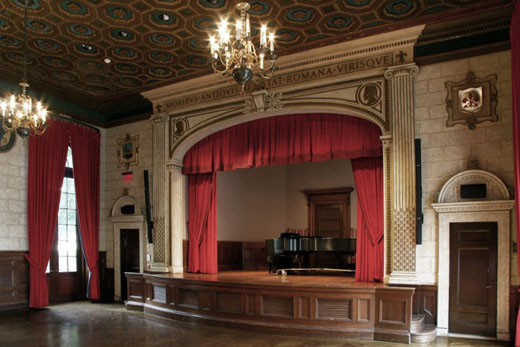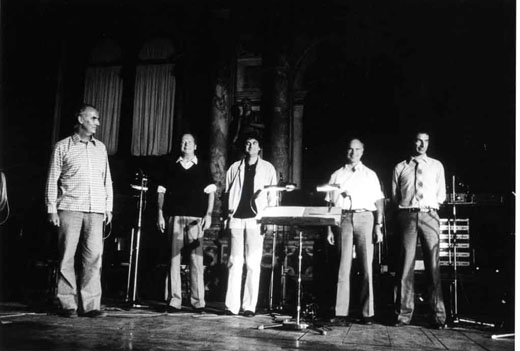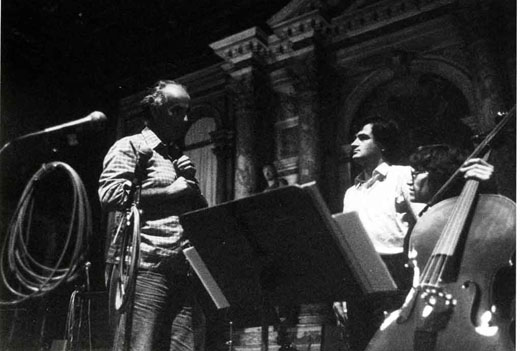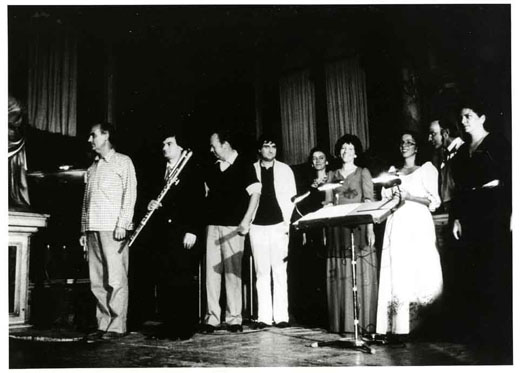Luigi Nono’s Quando stanno morendo, diario polacco n. 2
Wednesday - May 9, 2012 - 8PM
The Italian Academy at Columbia University
1161 Amsterdam Ave (directions)
free admission, no RSVP necessary
Concert Program
Hô (excerpts) for soprano (1960)
Maknongan for baritone saxophone (1976)
Pwyll for flute (1954)
Giacinto Scelsi
Friction for chamber ensemble and loudspeakers (2012)
Gregory Cornelius
Quando stanno morendo, diario polacco n. 2
for four female voices, bass flute, cello and live electronics (1982)
Luigi Nono
The program is being presented in collaboration with the Fondazione Archivio Luigi Nono, Venice and Harvestworks.
About the Program
Amp New Music is engaged in our most ambitious project to date: a concert at the Italian Academy in New York City featuring the US premiere of a major work by Italian composer Luigi Nono.
This concert requires an elaborate technological setup and the dedication of many individuals. We will be joined on this concert by the Ekmeles Vocal Ensemble, a terrific group of singers who specialize in new and experimental music, as well as a team of sound technicians and several instrumentalists from New York and beyond.
We are delighted to be hosted by the Italian Academy for Advanced Studies in their wonderful 'Teatro' Renaissance hall as part of their focus on masterpieces of the Italian avant-garde. Our concert will also feature the premiere of new composition for chamber ensemble and electronics by Gregory Cornelius and a vocal duet by Giacinto Scelsi.
The keyword for this concert is ‘collaboration’. In his composition, Nono asks the performers and sound engineers to work together to seek out what he called ‘il suono mobile’(the mobile sound). Our collaboration extends beyond the score into the logistical and even musicological coordination required to bring this work to the US. In preparing this production we have been assisted by the Fondazione Archivio Luigi Nono, Venice, an archive of Nono’s materials directed by his widow, Nuria Schoenberg Nono. The Archivio has sent us photos of the original production and they have put us in touch with individuals who worked closely with Nono. We would like to acknowledge Alvise Vidolin for sharing his experiences performing the work with Nono, as well as Nicola Buso who has provided us with SuperCollider software that emulates the original equipmentment used to perform the work.

The Teatro at the Italian Academy (courtesy of the Italian Academy)
Luigi Nono and Quando stanno morendo
Italian composer Luigi Nono (1924-1990) was a leading figure of the post-WWII European avant-garde movement that became identified with the summer festival for new music in Darmstadt, Germany. He was also one of the first to publicly break from ‘the Darmstadt School’ for what he saw as its emerging tendency towards nihilistic iconoclasm. Not one to shy away from controversy or confrontation, Nono became active in anti-fascist and anti-imperialist liberation movements around the world, and during the 1960s he sought ways to explicitly integrate his dual commitments to artistic abstraction and political engagement.
Later in his life, Nono turned inward to face the elusive and fragmentary moments of experience. Quando stanno morendo is a reflective work from this final period of his compositions. Like many of the works from this time, the composition involved a process of ‘hands-on’ experimentation with musicians and technicians at one of Europe’s leading music-technology laboratories, the Experimental Studio in Freiburg, Germany. This collaborative working process became itself so woven into the fabric of the resulting works that their scores retain the living fluidity of an oral tradition.
In Quando, the central dimension is vocal: four singers share a sober monody, a quiet lament parsed into its component outbursts, tremors and hesitations. The voices interweave and their ramifications are projected by an elaborate interactive electroacoustic setup into a multi-dimensional acoustic space. Singers and instrumentalists use microphones and live electronic processing techniques to shape and color each other’s sounds. Here, repercussions and reverberations acquire their own density, sonically materializing the frustrated political roar behind the composition.
Seven texts by five poets were selected and edited by Nono’s friend and fellow Venetian, Massimo Cacciari. The poems were arranged into two groups of three that surround a single text by Russian Futurist, Velemir Chlebnikov. The outer movements meditate past despair and future hope, while Chlebnikov’s central text, which accuses Moscow of having lost its way, becomes a protest against the authoritarian eastern bloc regime that imposed martial law in Poland on the 13th of December, 1981, just months after Nono had been invited to compose a new piece for a festival in Warsaw. The title of the composition was taken from the final lines of a poem by Chlebnikov which concludes the piece: “quando stanno morendo, gli uomini cantano...” (when they are dying, men sing...).
Photos from the 1982 Premiere in Venice, Italy

ALN FB547Q0005 © Courtesy Graziano Arici, Venice
Venice, Scuola Grande di San Rocco, October the 3rd 1982 (Festival Internazionale di Musica contemporanea di Venezia): Luigi Nono, Hans Peter Haller, Alvise Vidolin, Rudolf Strauss, Bernd Noll

ALN FB547Q0006 © Courtesy Graziano Arici, Venice
Venice, Scuola Grande di San Rocco, October the 3rd 1982 (Festival Internazionale di Musica contemporanea di Venezia): Luigi Nono, Roberto Fabbriciani and Marie France Uitti

ALN FD547Q0001 © Courtesy Graziano Arici, Venice
Venice, Scuola Grande di San Rocco, October the 3rd 1982 (Festival Internazionale di Musica contemporanea di Venezia): Luigi Nono, Roberto Fabbriciani (flute), Hans Peter Haller, Alvise Vidolin, Marie France Uitti (cello), Ingrid Ade, Monica Bair-Ivenz, Halina Nieckarz (Sopranos) Bernadette Manca di Nissa (Mezzosoprano)
